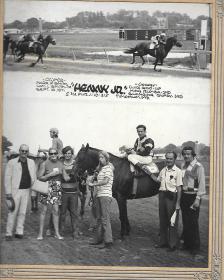As NancyM touched on.
Most “Fair Meets” if not all that are not sanctioned, licensed by the state for legal betting and have no little to no State oversight, no racing commission involvement. They are considered by the State as exhibition races. With very little prize money offered. There might be a cap on how much prize money can be offered depending on the state.
This type of racing, flat or harness at Country Fairs goes back a LONG way in this country.
With very little oversight brings a “no holds bared” way of racing. There is not drug testing, jocks can get away with rough riding styles etc.
Just because betting is not legal doesn’t mean there isn’t a heck of a lot of betting going on. This is were the “prize money” comes from.
“When I bought her, I was told 'the owners who run county fairs are a whole ‘nother breed of horse owner’ - and this was not said in a positive manner”
I can see why this was said. Owner/trainers who run horses at “country meets” can have a totally different mentality. In places, esp out west most “racing circuits” are just that Fair Meet, but a lot of clandestine meets also. With no drug testing, little to no oversight by the meet organizers some horses can and do get pretty beat up.
When it comes to horses being clipped, Well, I have bred and raised quite a few. The vast majority are not easy to clip at first, second, even third asking. It’s the horse’s natural, build in fright flight instincts. The sound of the clippers may sound like a rattle snake to them or some other predator sound they are preprogrammed to run from. Humans are born with fear of the dark, things that go bump in the night. It was my, and others of like job to teach them, acclimate them to the basics of human interaction and domestication. I sure wish they came out of their mamma’s ready to throw a saddle on and ride off into the sunset.
As to “buzzers”, “machines” aka “battery” and a horse associating this with the sound of clippers, IMO this is a stretch
A lot of horses are more reactive to sounds then others. The “force” is strong with them. I would not automatically assume something was “done” to them.
The name “buzzer” I assume comes from how they were originally made. The sound made by the electricity arching. Not much different than the sound a spark plug makes when being tested. Probably where the idea came from? From what I was told back in the day, if the jock wasn’t real good with it. They would shock themselves.
I assume the name “machine” comes from a loose translation from Spanish to English. A lot of the Spanish speaking guys working for me called a lot of things “the machine” for lack of knowing the exact name in English.


